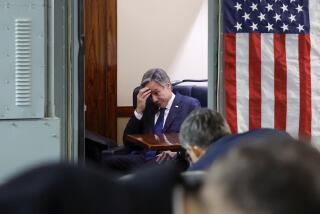Shultz Calls for Quarantine of Beirut Till Calm Returns
- Share via
WASHINGTON — Secretary of State George P. Shultz refused Sunday to discuss possible U.S. retaliation if harm befalls U.S. hostages seized in Beirut but called for a world quarantine of that combat-wracked city until its citizens “take control of the situation.”
“The people of Beirut have to recognize that what they are doing is ruining themselves,” Shultz said. “They . . . in effect have a plague there and they’re isolating themselves from the world. And the world should isolate them, and they should take control of the situation.”
Beirut’s inhabitants “have a responsibility for their own community, and they’re not exercising it,” Shultz said.
Shultz avoided specific comment when asked on ABC’s televised “This Week With David Brinkley” how the United States will respond to a taped television message received Sunday from Alann Steen, a hostage. It warned that Steen and three other professors captured with him on Jan. 25 would be killed today if the demands of their captors are not met. The group, Islamic Jihad for the Liberation of Palestine, has threatened to kill the hostages unless 400 Palestinians now in Israeli jails are released.
Good Terrorism Policies
“We’ll respond as the situation merits,” Shultz said. “I’m not going to forecast it. But we do have a clear and basically good set of policies on terrorism and the tactical implementation of them has broadly succeeded.”
Shultz said he has no way of knowing how seriously to take the kidnapers’ threat, then observed: “They always issue threats like that. But one thing you just can’t do is start jumping whenever a threat is made.”
In London, Defense Secretary Caspar W. Weinberger denied charges by the Islamic group, relayed by Steen, that the United States plans to use its naval buildup in the eastern Mediterranean for a strike on Lebanon in an effort to free the hostages.
‘Normal Naval Maneuvers’
“These are reasonably normal naval maneuvers . . . that go on all the time,” Weinberger told a British Broadcasting Corp. interviewer. “As situations get somewhat more critical . . . then the presence may increase. But it is not bellicose. It is simply good, prudent management.”
In Jerusalem, meanwhile, the Israeli government indicated cautious willingness to discuss a possible exchange of 400 Arab prisoners for a downed Israeli flier--but not in any public negotiation and not under a terrorist ultimatum. Foreign Minister Shimon Peres said in a radio address: “If anyone has any offers, he should please turn to Israel in an orderly fashion, and he will be given an orderly answer.”
Two former secretaries of state, appearing on NBC-TV’s “Meet the Press,” recommended that the Reagan Administration do nothing to pressure Israel into going along with a hostage deal and generally endorsed Shultz’s approach to terrorism.
Don’t Lean on Israel
“I would not lean on Israel if I were there,” said Cyrus R. Vance, who headed the State Department under former President Jimmy Carter. Henry A. Kissinger, who filled the post in the administrations of Richard M. Nixon and Gerald R. Ford, agreed.
Kissinger went on to commend the Reagan Administration for adopting “a strong position and . . . the correct position” on terrorism. While the position was weakened by “some of the actions that were taken on Iran,” Kissinger said, “to the extent that these are recognized to be a big mistake . . . we should go back to first principles as enunciated.”
Shultz, in his ABC interview, was noncommittal about the circumstances under which Wall Street Journal correspondent Gerald F. Seib was freed last week after being detained by Iran, which accused him of spying while on a press tour that included the Iran-Iraq war front.
“He was released,” Shultz said without amplification.
No Deals on Seib
Shultz then told a questioner that he could “absolutely” guarantee that Seib’s release was not the product of a deal with Iran, but he gave no details.
He was almost as laconic when he was asked to name the principal for whom missing Anglican Church representative Terry Waite was negotiating in trying to win freedom for American hostages in Beirut.
Waite “doesn’t have a connection with an American institution or a government,” Shultz said. He said he did not know on what basis Waite was bargaining when he disappeared in Beirut on Jan. 20, except as a representative of the Church of England.
More to Read
Sign up for Essential California
The most important California stories and recommendations in your inbox every morning.
You may occasionally receive promotional content from the Los Angeles Times.













